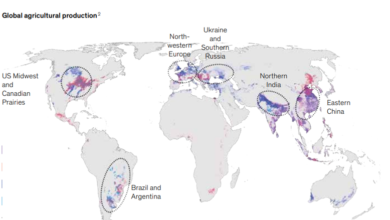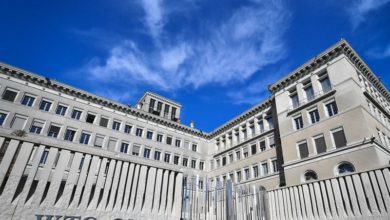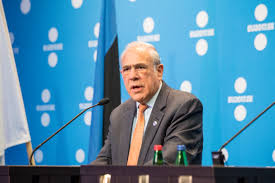
L’échec de la ministérielle de l’OMC à Buenos Aires en décembre dernier sonne-t-elle le glas de l’OMC ? C’est possible mais peut-être pas souhaitable comme le développe Sophy Murphy1 qui voudrait voir émerger de la crise actuelle une remise en cause des fondements de l’organisation genevoise.
Dans l’article que nous reproduisons ci-dessous, la conseillère en charge du programme Commerce et Gouvernance mondiale du think tank américain à l’IATP (Institute for Agriculture and Trade Policy), revient sur la stratégie de blocage des Américains qu’elle qualifie de « version belliqueuse de la coopération internationale ».
Pour elle, l’échec du cycle de Doha s’explique aussi par sa trop grande filiation avec le cycle précédent, le cycle de l’Uruguay, et ce, alors que « l’engouement, les yeux pleins d’étoiles, pour la libéralisation du commerce » est loin d’être le même que durant les années 1980.
Les négociations multilatérales devraient repartir sur d’autres bases pour avoir une chance d’aboutir et être profitable à tous et, en premier lieu aux pays en développement. Pour Sophia Murphy, il est temps de réinitialiser le logiciel multilatéral et elle propose pour commencer quatre principes-phares :
- la libéralisation commerciale n’est pas un objectif en soi, mais un moyen pour atteindre des objectifs supérieurs comme la lutte contre le changement climatique, la sécurité alimentaire ou la réduction des inégalités ;
- le programme de libéralisation commerciale ne peut être uniquement dicté par les entreprises aux seuls fins de les protéger des législations des pays où elles exportent ;
- l’OMC doit limiter les perturbations causées par le dégagement des surplus à l’export entrainées par la disparition des mesures de contrôle de la production et le recours aux subventions directes ;
- au-delà de la clause d’exception prévue à l’article XX, les modes de production doivent pouvoir être pris en compte dans les limitations au commerce.
Des principes qu’Agriculture Stratégies partagent largement. La discipline agricole de l’OMC a consisté à réduire certaines pratiques déloyales, mais n’a pas cherché à favoriser des coopérations entre ces membres pour limiter l’instabilité structurelle des marchés agricoles, car prédomine l’idée à l’OMC que les marchés se stabilisent d’eux-mêmes. Ce fondement biaisé a été invalidé par la crise alimentaire 2007/08, et dix ans après, force est de constater que l’on continue de croire que c’est l’ouverture commerciale qui entraine la stabilisation des marchés, alors que l’histoire des échanges agricoles au 20ème siècle a précisément montré l’inverse.
It was somehow fitting that the only rain to mar perfect late spring days of the 11th WTO Ministerial Conference in Buenos Aires last week fell as the meeting ended in failure. The purpose of a ministerial is to provide direction for the coming two years of trade negotiations; that is, to sign any agreements reached and to provide a working agenda for the biennium ahead. It is a necessary part of the WTO’s governance system—the moment when the public servants give way to the politicians; the moment the WTO is most likely to come to the attention of national media. This time, governments have nothing to show for their last two years of work and nothing much to offer to help make the biennium ahead more productive.
The failure to reach decisions in Buenos Aires was not a WTO Ministerial first: Seattle in 1999 collapsed a little too literally in flames, while in Cancun in 2003, the meeting ended early in anger when developing countries stalked out, furious at the U.S. and E.U. presumption that they were still in control of the agenda. Unprecedented or not, failure is not good for an organization, especially one with not a lot to show for its 20 years of existence and not inconsiderable use of limited public finance. Next year is the 10th anniversary since the WTO last significantly advanced the negotiations on its work plan, known as the Doha Agenda. WTO members never adopted those advances and are nowhere near adopting them now. In Buenos Aires, the very blandest of Ministerial Declarations (reduced to a kind of notice that a meeting took place) proved too bland for countries like India that were demanding resolution to substantive issues, especially public stockholding of food. Meanwhile, the United States Trade Representative had nothing to offer but his government’s refusal to talk substance. An entirely predictable, but, nonetheless, painful standoff was the result. Not with a bang—with hardly even a whimper—the headlines announced, “The end of the WTO as we know it”.
Truth to tell, we can only hope so. Change in the international trading system is long overdue.
I. Nobody wins
The most common reaction from governments and business associations to President Donald Trump’s trade policy is to lament the loss of U.S. leadership in the promotion of trade liberalization. The critics have a point: There is little to celebrate in the current U.S. leadership. Yet, the problem has been coming for a while, and the issue is not quite as they describe it. Already, President Barack Obama’s Administration treated the WTO with disdain, choosing to focus its energy on so-called “mega-regional” agreements, in particular, the Trans-Pacific Partnership. Under President Trump, that disdain has given way to something more insidious: A deep dislike of multilateralism itself, coupled with a profound disregard for the niceties of negotiations. The U.S. is poorly served by this bellicose version of international cooperation.
The U.S. is a rich country and an important actor in international markets. It is also losing its once dominant role. U.S. trade continues to grow, but overall global trade has grown much more, leaving the U.S. with diminishing shares in many emerging markets. U.S. behavior now makes cooperation in the face of common challenges less likely; other governments are looking for ways to work around, rather than with, the fading super-power.
Developing countries are losing from the paralyzed status quo, too. Holding, rather desperately, to the Doha Agenda as the only basis they respect for negotiations, they cannot stop the surge of interest in other issues as time goes on. The Doha Agenda includes issues that matter to developing countries. But they need a new approach. The Doha Agenda, itself, is a messy patchwork of unfinished business carried over from the Uruguay Round Agreements that were finalized in 1994. That agenda dates back to the 1980s, and to a starrier-eyed infatuation with trade liberalization. It does not offer enough to today’s decision-makers.
The world needs a WTO as we have not yet known it—a WTO focused not on trade liberalization for its own sake, but as an inter-governmental decision-making body that seeks to understand and respond to trade’s role in realizing important shared goals, whether limiting the damage caused by climate change, tackling inequality, or investing in sustainable practices across the whole economy.
II. Time to reset
Too many governments support an agenda clearly written by the businesses already committed to global markets. They want to harmonize standards, limit taxation, and smooth the workings of their value chains. That want greater and greater interference in the domestic economic (and legal) space of countries, apparently oblivious to the hostile political reaction they have provoked. Of course, exporters are a legitimate voice in trade deliberations; they just cannot be the only voice. Governments have much broader obligations than the promotion of export sales. The WTO gets no legitimacy from being an organization dedicated to increasing trade flows and the profits of trading companies. Its legitimacy rests on its ability to ensure a fair, rules-based system in which all members feel heard and respected.
The time has come for trade rules that do not stop governments from domestic experiments with fairer and more sustainable economies, but rather encourage them, while protecting other countries from negative outcomes.
What would a meaningful agenda for trade rules look like? Take just two examples:
1. The WTO could limit the disruption caused by using export markets for surplus disposal, a recurrent problem in international trade. In agriculture, the problem arises due to the use of subsidies (for both production and export) coupled with the loss of policies to limit production (supply management, production limits in exchange for price floors, etc.). It is also encouraged by the highly concentrated markets in which commodity traders and processors operate, creating disparities that trade liberalization exacerbates because the rules ignore the lack of competition in international markets, obsessing, instead, over the rights foreign companies assert to play a role in domestic economies. Moreover, existing WTO rules complicate and in some cases outright ban the measures governments might adopt to protect themselves from dumping.
2. The WTO could revisit the rules surrounding production and processing methods. Existing trade rules assert that products must be considered “like” if the final products are indistinguishable. But we know production methods matter. How much greenhouse gas was emitted during production? How much water was used? How easily will resulting pollution be cleaned up? Were workers’ rights respected during production? Labels can help, but slavery was not ended by voluntary measures. Consumers cannot know enough, nor do they wield enough power, to transform production systems with better buying decisions. Governments have commitments to human rights, to environmental treaties, and to the Sustainable Development Goals. Pretending all production methods are equal is not just untenable, it is willfully blind.
These signs are not the end of the story. But the lack of public confidence in the WTO, and the lack of trust among WTO member states, could end the organization altogether. The world is not well served by a vacuum where rule-making for trade should happen. I remain committed to the idea that the WTO’s transformation is better than its demise. But pushing an agenda that focuses only on the wishes of existing transnational business is no more helpful than building walls along the border. India has promised to host a gathering of developing countries in February to discuss a shared trade agenda. There is plenty of work to be done.
Sophia Murphy, Institute for Agriculture and Trade Policy











